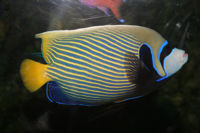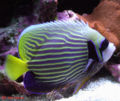Difference between revisions of "Pomacanthus imperator"
From The Aquarium Wiki
m |
|||
| Line 26: | Line 26: | ||
|min_sg=1.020 | |min_sg=1.020 | ||
|max_sg=1.025 | |max_sg=1.025 | ||
| − | |min_tank_size= | + | |min_tank_size=200 |
|min_tank_size_unit=G | |min_tank_size_unit=G | ||
|min_ph=8.1 | |min_ph=8.1 | ||
Revision as of 18:04, 15 June 2020
Emperor Angelfish
Pomacanthus imperator
757 Litres (200 US G.)
35-40 cm (13.8-15.7")
8.1 - 8.4
22.2-25.6°C (72 -78 °F)
8-12 °d
1:1 M:F
2-5 years
Family
Pomacanthidae
Contents
Additional names
- Emperor Angelfish, Imperator Angelfish, Imperial Angelfish, Red Sea Emperor Angelfish
Additional scientific names
- Chaetodon imperator, Acanthochaetodon imperator, Holacanthus imperator
Sexing
- It is difficult to visually sex these fish.
Tank compatibility
- This is a large Angelfish that will be aggressive towards other Angelfish or fish of the same shape. They are generally not reef safe with delicate soft corals, but tougher SPS corals are a possibility with caution. Do not keep with small tank mates that look as though they could be a mouth-full, as chances are, they will get munched.
Diet
- They should be fed Spirulina, marine algae, high-quality angelfish preparations, mysid or frozen shrimp, and other meaty foods.
Feeding regime
- Feed once or twice a day.
Environment specifics
- They require a spacious light tank with plenty of swimming and growing room for this large fish. They will need hiding places provided.
Behaviour
- A large and territorial fish, they will become quite dominant within a tank environment.
Identification
- A large oval-shaped and laterally depressed fish. As with many Angelfish, juvenile colouration is completely different to adults. Juveniles are black with circular white and blue stripes starting at the tail. Adults have a bold, blue body covered with bright yellow horizontal stripes culminating in a bright yellow to orange caudal fin. There is a blue-black "mask" covering the eyes, a similarly-coloured vertical band extends from the pectoral fin two-thirds of the way up the body. This band is highlighted in sapphire-blue in front, and bright yellow, caudally. The mouth is white.
Pictures
External links
- Fishbase (Mirrors:
 )
)



